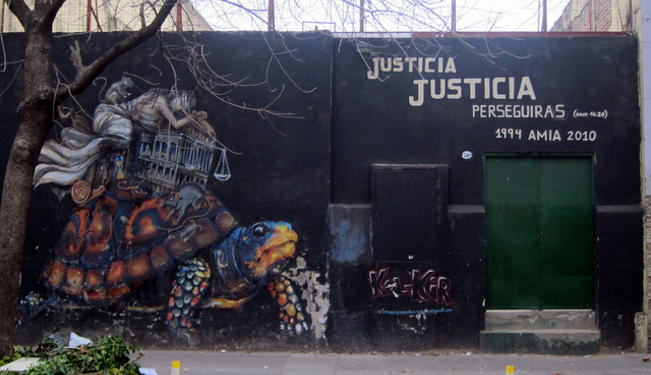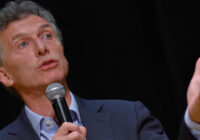One cannot help but ask why, after 18 years of mishandled investigations, corruption charges, and cover-ups, are Iran and Argentina discussing the 1994 AMIA Terrorist Attack.
The Iranian and Argentine governments recently signed a bilateral memorandum of understanding, establishing a "truth commission" to investigate the 1994 terrorist attack on the Jewish community center in Buenos Aires. The announcement came as a shock to the victims’ families, since the Argentine government had previously officially accused Iran of orchestrating the attack; a charge Iranians have repeatedly denied.
One cannot help but ask why, after 18 years of mishandled investigations, corruption charges, and cover-ups, is this “truth commission" taking place now? Following the attack, Iran’s role has been primarily to obstruct the investigation. They have never admitted their culpability and would never extradite its leading citizens to face trial in Argentina. Instead, the Iranian government has used their money and influence to take advantage of corrupt Argentine officials in an attempt to derail the pursuit of justice. Meanwhile, Argentina has mostly paid lip service to their stated desire to find and punish the perpetrators; behind the scenes machinations clearly demonstrate a political infrastructure only too happy to accept Iranian trade and bribes in exchange for complicity in the murder of Jewish citizens of Argentina.
What possible endgame do the Iranians and Argentines hope to achieve in these negotiations that will both satisfy critics of Argentina’s horribly bungled investigations, and absolve the Iranian government of blame? What are the political and economic interests involved? Who stands to gain from this initiative? And to what effect, if any, will these talks have in bringing the perpetrators of the bombing to justice?
The Attack
The suicide bombing of the Asociación Mutual Israelita Argentina (AMIA) and Delegación de Asociaciones Israelitas Argentinas (DAIA) building left eighty-five people dead and hundreds wounded in the deadliest terrorist attack in Argentine history.
The Argentine government launched an investigation into the attack and unsurprisingly, the trail of evidence led unequivocally to Iran and Hezbollah.
Two years earlier, the Islamic Jihad Organization, believed to be tied to Iran, claimed responsibility for the bombing of the Israeli Embassy in Argentina. In a sign of things to come, the investigation into this attack, with its 29 dead and over 250 wounded, led to no arrests.
Mishandled Investigation
The story of the Argentine investigations following the attack, read like many of the political scandals plaguing the Latin American continent.
The Justice in charge of the original investigation was later impeached for destroying incriminating evidence and offering to bribe a witness. A former investigator claimed that he had been kidnapped, tortured and warned not to proceed with his investigations. Argentine courts later implicated then-President Carlos Menem, who is of Syrian descent, of sabotaging the investigation and destroying crucial evidence. Reports rumored that Iran had deposited USD10 million to a Swiss-bank account belonging to Menem.
Menem, along with his brother and a number of state security officials, are set to stand trial in Argentina for “perverting the course of justice.” As of now, no trial date has been set.
In 2005, a new chief prosecutor, Alberto Nisman, took over the case and Argentina had enough evidence to officially accuse the Iranian government for orchestrating the attack and using its proxy Hezbollah to carry it out.
The evidence implicated former Iranian President Akbar Rafsanjani, his former foreign minister, former commander of the Iranian Revolutionary Guard, and former intelligence minister, among others.
Nisman's evidence was so credible that Interpol upheld Argentina’s request and issued “red-notices” for these Iranian nationals. Iran has refused to extradite any of their citizens to Argentina, or to any other third-party country.
Recent Bilateral Developments
During a visit to Syria in 2010, Argentina’s Foreign Minister Hector Timerman allegedly told Iranian-ally and Syrian President Bashar al-Assad that Argentina would suspend the AMIA/DAIA investigations in exchange for strengthened economic ties.
A leaked Iranian cable reportedly quoted Iran's Foreign Minister stating, “Argentina is no longer interested in solving those two attacks, but in exchange prefers improving its economic relations with Iran.” Timerman denied these allegations.
In September 2012, at the UN General Assembly, Argentine President Cristina Kirchner used her limited time at the podium to announce that Argentina and Iran would for the first time, hold bilateral meetings relating to the AMIA/DAIA terrorist attack. The announcement and its platform caught many by surprise, as it came when much of the world was focused on isolating Iran and its nuclear ambitions.
Their respective foreign ministers met for initial talks at the UN in New York and followed-up with meetings in Geneva. In January 2013, both Timmerman and his Iranian counterpart signed a memorandum of understanding on the sidelines of an African Union summit in Addis Ababa, Ethiopia. The memorandum led to the establishment of the Truth Commission, which will be made up of foreign legal experts "to analyze all the documentation presented to date by the judicial authorities of Argentina and Iran." According to the memorandum, the commission’s mandate is solely to present recommendations about how the case should proceed within the legal and regulatory framework of both parties.
Victims’ families are shocked that the “alleged” perpetrator of the crime, Iran, is an active participant in the investigation and gets to decide the composition of legal experts.
Motivating Factors
Thus the question remains, what is the reason for this bilateral commission? The bottom line: these negotiations do not serve the intended purpose. Argentina and Iran are using these negotiations as a mechanism to buy time, while continuing topursue their own political and economic agendas at the expense of due justice.
Although relations between Argentina and Iran have remained tense throughout these 18 years, it has not stopped them from engaging in significant bilateral trade. In 2007, Argentina exported USD319 million in goods to Iran. In 2011, Argentine exports to Iran totaled USD1.068 billion, making Argentina, Iran's second largest trading partner in Latin America.
Iran, significantly isolated and sanctioned by numerous global players, is looking for allies who can help ease their economic difficulties. Iran’s currency has been hard hit by UN economic sanctions. Coincidentally, the week that Iran proposed initial talks with Argentina was the same week that the value of the Rial fell to the lowest levels ever recorded.
Argentina wishes to emerge from the economic and diplomatic shadow cast by its neighbor and competitor, Brazil. Brazil has increasingly become a player on the world stage, recently attempting to broker a resolution to the Iranian nuclear imbroglio. Argentina wants to see itself as a more valuable participant in global politics and is looking to expand its ties across continents.
Meanwhile, Iran has been expanding its presence in South America through friendships and high-profile visits to Venezuela, Nicaragua, Cuba and Brazil. It views Latin America – with its weak judicial systems, rampant corruption, widespread anti-American sentiment, and left-leaning governments seeking to battle US hegemony – as an ideal staging ground for its illicit activities.
Additionally, Argentina is also one of the 35 states that sit on the United Nations’ International Atomic Energy Agency (IAEA) Board of Governors. Iran's nuclear ambitions have been a major source of IAEA activity and Iran needs all the allies it can find there.
Domestic Politics in Iran and Argentina
Survivors of the AMIA attack and victims’ relatives founded Memoria Activa, a grassroots advocacy group committed to bringing the perpetrators to justice. Their initiatives have gained support across the country and significantly increased their political capital. Each year, thousands of people and international leaders hold a vigil to mark the anniversary of the attack. President Kirchner is walking a fine-line domestically, attempting to make progress in solving the case, while simultaneously expanding Argentina’s trade and political influence in the Middle East.
Iran itself is plagued by political and economic turmoil. The populace is suffering as a result of international sanctions, while grievances toward government policies are growing. In order to counter this, the Iranian government needs to show that it is not completely isolated from the global community by flaunting its relations with other countries. Furthermore, Iran wishes to shed its terror-sponsoring reputation as a way to improve its global standing. These are the considerations that drive Iranian policy in Argentina.
While struggling with competing interests, it seems unlikely that Iran will hand over its high-ranking government officials to Argentina. Instead, Argentina will tout the negotiations as a sign of positive progress, while in reality, it will simply continue to mislead the victims of terror by providing them with false hope for a just resolution.
The views expressed in this article are the author's own and do not necessarily reflect Fair Observer’s editorial policy.
Support Fair Observer
We rely on your support for our independence, diversity and quality.
For more than 10 years, Fair Observer has been free, fair and independent. No billionaire owns us, no advertisers control us. We are a reader-supported nonprofit. Unlike many other publications, we keep our content free for readers regardless of where they live or whether they can afford to pay. We have no paywalls and no ads.
In the post-truth era of fake news, echo chambers and filter bubbles, we publish a plurality of perspectives from around the world. Anyone can publish with us, but everyone goes through a rigorous editorial process. So, you get fact-checked, well-reasoned content instead of noise.
We publish 2,500+ voices from 90+ countries. We also conduct education and training programs
on subjects ranging from digital media and journalism to writing and critical thinking. This
doesn’t come cheap. Servers, editors, trainers and web developers cost
money.
Please consider supporting us on a regular basis as a recurring donor or a
sustaining member.
Will you support FO’s journalism?
We rely on your support for our independence, diversity and quality.






Comment